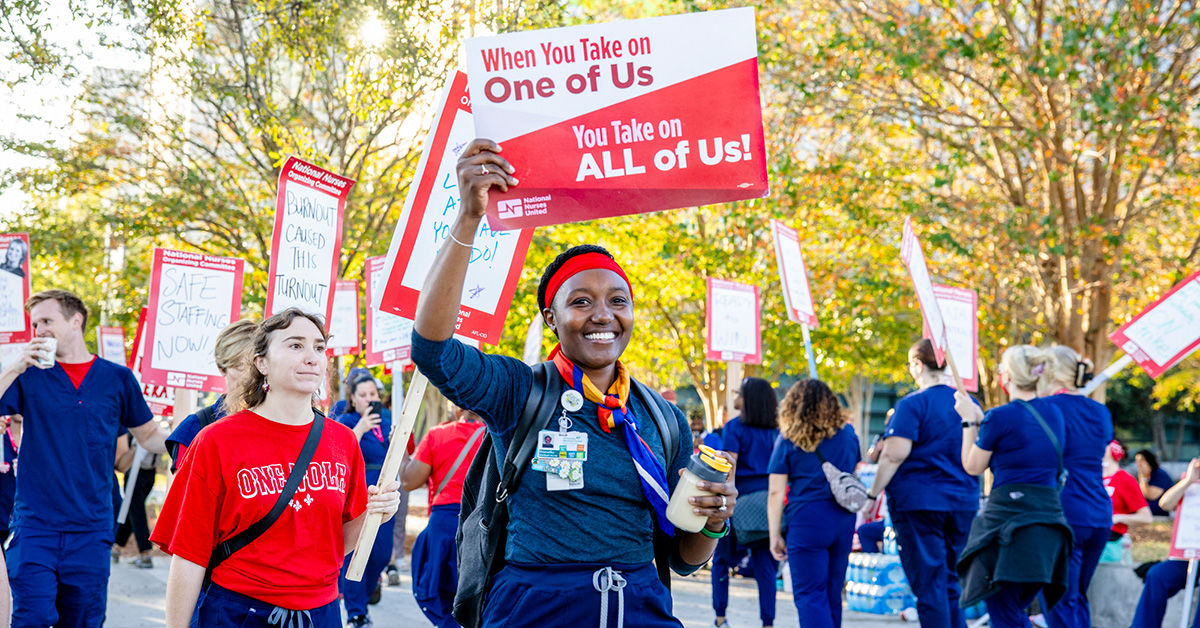New Orleans nurses stage historic strike

University Medical Center nurses fight for first contract
By Rachel Berger
National Nurse magazine - Oct | Nov | Dec 2024 Issue
Nurses at University Medical Center (UMC) in New Orleans, La. held a historic one-day strike on Oct. 25 after management failed to address patient safety concerns during contract negotiations. UMC nurses already made history in December 2023 after voting to join National Nurses Organizing Committee, an affiliate of National Nurses United, becoming the first unionized private-sector hospital in the state of Louisiana and members of the largest union of registered nurses in the United States.
Since bargaining began in March for a first contract, UMC management has delayed negotiations, including postponing bargaining sessions and refusing to make meaningful responses to nurses’ proposals on key issues such as workplace violence and safe staffing.
“We are striking because we see our patients being short-changed every day in our hospital by management’s decisions,” said Hailey Dupre, a registered nurse in the endoscopy unit. “During our contract negotiations we have repeatedly put forward proposals to address these patient safety concerns, but UMC’s berating and belittling behavior at the bargaining table shows their lack of commitment to reach an agreement that puts patients first. We are committed to advocating for our patients at the bedside, and at the bargaining table. When we step out on the strike line, we are taking that advocacy to the next level because we are determined to honor our patients’ needs and our professional duty.”
Nearly 600 UMC nurses have proposed measures to prevent workplace violence and improve safe staffing. The nurses’ proposals include requiring UMC to produce a comprehensive workplace violence prevention program for all units, work areas, and on all facility grounds, including parking structures; legal protections against retaliation for reporting unsafe conditions; and proposals that would improve recruitment and retention.
Nurses report that since the start of this year, there have been at least three instances where lethal weapons were brought into the hospital and found in patient care areas. More than 80 percent of nurses signed a letter calling for UMC to take steps to prevent these acts of violence from happening in the first place.
“When nurses fear for their well-being and the well-being of their patients, they suffer moral injury and distress,” said Heidi Tujague, a registered nurse in the emergency department. “We are seeing nurses leave our hospital due to the violence they have experienced at work. To stop the exodus of experienced nurses, management must implement commonsense strategies, such as supporting victims of workplace violence or providing us with adequate staffing, to address the needs of our patients in a timely fashion.”
Nurses say unsafe staffing or short staffing is another issue throughout the hospital. When a nurse is caring for more patients than is optimal, patient outcomes suffer.
“When a nurse is caring for more patients than is safe, they may not have the time to turn a patient as much as they would like, which can lead to bedsores,” said Kisha Montes, a registered nurse in the behavioral health unit. “Nurses who help discharge patients may not have the time they need to provide important education to patients to ensure they do not return to the hospital. The best nursing comes when there is time for patients and nurses to create a strong relationship which allows for the medical, emotional, and educational support that is critical to healing.”
Data from the Centers for Medicare and Medicaid Services (CMS), which tracks hospital performance, suggests the staffing crisis at UMC is negatively affecting patients.
According to a KFF Health News database of CMS data, UMC was penalized every year from 2017 through 2023 for high readmissions to the hospital, which usually indicates patients didn’t receive the care they needed the first time. The hospital was also penalized from 2017 through 2022 for a high rate of hospital-acquired infections (all hospitals were exempt from the penalties in 2023). In addition, from 2020 to 2022, UMC had a high rate of bedsores, which are associated with a lack of adequate staffing and can present serious problems for patients.
“We cannot continue caring for our patients in a hospital where violence and chronic understaffing threaten both nurses and patients,” said Lauren Waddell, a nurse practitioner in the neuroscience clinic. “Our community deserves better and we will continue to push for contract language at the bargaining table to ensure our patients get the care they need and deserve in a hospital that is safe.”
Rachel Berger is a communications specialist at National Nurses United.